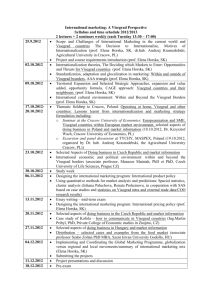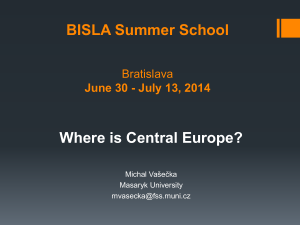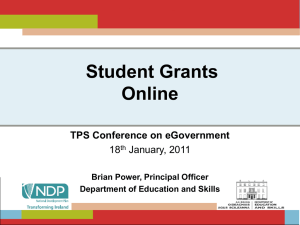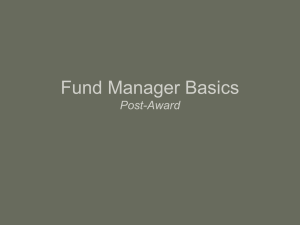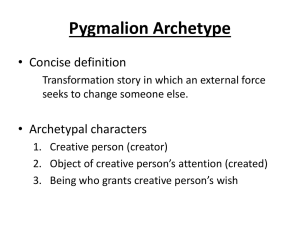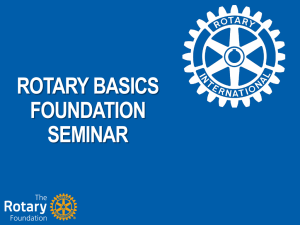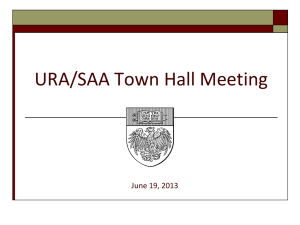cooperation, fund and study
advertisement
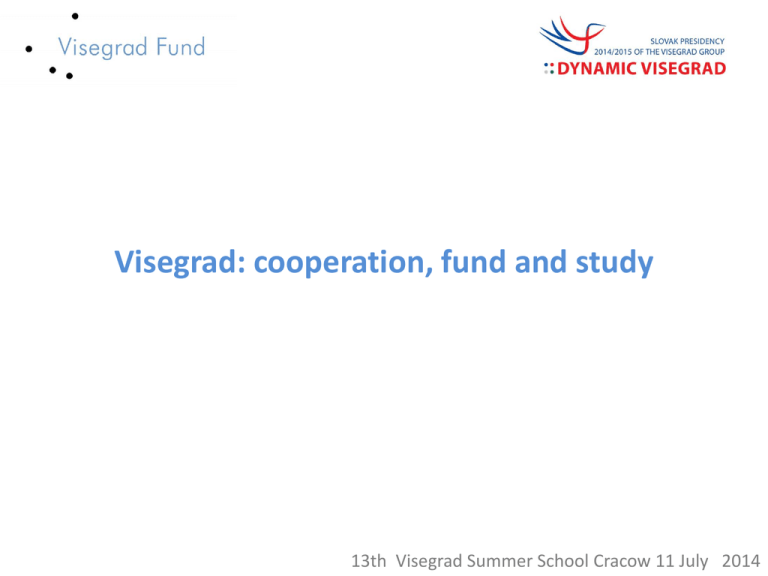
Visegrad: cooperation, fund and study 13th Visegrad Summer School Cracow 11 July 2014 The Path to Visegrád… 1986–1990: 1989: 1990: Tensions ease between the East and West, Cold War coming to an end; increasing demand for a direct, regional cooperation between some countries “Quadragonale” established between Austria, Hungary, Yugoslavia, and Italy*, + Czechoslovakia (CS) = “Pentagonale” (1990), + Poland (PL) = “Hexagonale” (1992); later transformed into current Central European Initiative** (18 members) “Bratislava Meeting” initiated by V. Havel: CS + HU + PL (+ YU, IT, AT) http://www.visegradgroup.eu/about/history 2 The Path to Visegrád… 1989: December - first of regular meetings of CS + HU + PL ministers of foreign affairs: How the three countries could support each other in dismantling the Soviet empire, transforming our countries politically and economically, and integrating with the institutions of the developed world? J. Dienstbier 1990: Nov. 1990: The first success in the cooperation—departure of Soviet troops, dissolution of the Warsaw Pact (1991) led to the formalization of the cooperation J. Antall suggests (OSCE Paris) a follow-up to Bratislava Meeting to take place in Visegrád* http://www.visegradgroup.eu/about/history 3 The Path to Visegrád… Jan. 21, 1991: CS, HU and PL MFAs decide to achieve the “quickest dissolution of the Warsaw Pact” and to work together to negotiate all association agreements with the European Community Feb. 15, 1991: Summit meeting of the “troika” (V3) in Budapest; later on, Visegrad Declaration signed in Visegrád Visegrád was selected by J. Antall as a symbolic reconnection to the royal peace and economic talks among Charlers Robert of Anjou, John of Luxembourg, and Casimir III in Visegrád in 1335/1336 http://www.visegradgroup.eu/documents/essays-articles/visegrad-1335 4 The Path to Visegrád… Oct. 1991: May 1992: 1993–1998: Oct. 1998: May 1999: June 2000: 2nd V3 summit in Cracow 3rd (last) V3 summit in Prague (CS → CZ + SK on Jan. 1, 1993) cooperation slows after the split of CS and due to the prevalence of individual efforts towards the Euro-Atlantic integration* Budapest Summit: PMs of CZ + HU + PL express support for revitalization of the cooperation Bratislava Summit (formal comeback): approval of “Contents of Visegrad Cooperation” International Visegrad Fund established (Štiřín) http://www.visegradgroup.eu/about/cooperation 5 Visegrad Fund: Basic Characteristics • V4’s only solid organization to date • international organization accredited with SK MFA • equal rights of V4 states: – annual rotating presidency (January–December) (presidencies in the group: July–June) – rotating management (3-year missions) – consensus in decision-making • equal contributions of V4 states (€2M p.a.) • external funding (NL, US, SE, CH…) • 2-member management + 13-member staff (+ interns) www.visegradfund.org 6 The Fund’s Main Aims • (financial) support of movement of people and ideas • strengthening of the internal cohesion of the region • weakening of historical animosities and awareness-building • instrument of joint V4 foreign policy (since 2004): – support of transfer of know-how from the region to the Western Balkans and Eastern Partnership countries (20% of overall funding in 2013) – program priorities defined by the group (Strategic Grants, Visegrad+, V4EaP program chapter) • key leverages: grant programs + “mobilities” (scholarships, fellowships, artist residencies) www.visegradfund.org/about 7 Program Overview Academic and Mobility Programs Grant Programs Visegrad Scholarship Program: Small Grants • Intra-Visegrad, In-Coming, Out-Going Standard Grants Visegrad Artist Residency Program (VARP): Visegrad Strategic Grants • VARP—Visual & Sound Arts Visegrad Strategic Conferences • VARP—Performing Arts Visegrad+ (Western Balkans) • Visegrad Literary Residency Program Visegrad 4 Eastern Partnership Program: • VARP in New York • Flagship Projects Visegrad University Studies Grants • V4EaP (Extended) Standard Grants Visegrad–Taiwan Scholarships • V4EaP Visegrad University Studies Grants Visegrad Scholarships at OSA IVF–NSC Taiwan Joint Research Projects www.visegradfund.org/scholarships, …/residencies www.visegradfund.org/grants 8 Grant Project Categories: Small/Standard Grants • cultural cooperation (47%) • scientific exchange and research (20%) • education (15%) • youth exchanges (10%) • cross-border cooperation (7%) • promotion of tourism (2%) 100% = 3,911 grant projects approved in 2000–2013 www.visegradfund.org/grants 9 Basic Grant Principles • projects must have “Visegrad added value” • projects involve entities from at least 3 V4 countries* • grants cover about 80% project costs (e.g. 70% w/in Strategic Grants, 100% w/in Strategic Conferences) • reimbursements in tranches with advance payments (up to 80% of project costs) • 15% overhead costs • costs documented through copies of invoices and bills • only a single project per applicant* (multiple project-partnerships possible) * Strategic Grants, Visegrad+ projects and the V4EaP chapter are exceptions www.visegradfund.org/grants/guidelines 10 Overview—Basic Grant Programs Small Grants Standard Grants Strategic Grants < €6,000 > €6,001 €40,000 (ca. €13,000 on average) (on average) 80% 80% 70% Timeframe 6 months 12 months 12–36 months Cash limit 50% 30% 20% Overheads 15% 15% 15% Evaluation 50 working days 60 working days 50 working days Deadlines March 1, June 1, Sept. 1, Dec. 1 March 15, Sept. 15 April 15 Project budget Max. IVF share www.visegradfund.org/grants/guidelines (+ 7% tangible/intangible assets) 11 Who Can Apply? • • • • • majority of applicants are CSOs and other NGOs primary/secondary schools, colleges + universities municipalities, regional governments other public institutions (museums, galleries, sports clubs) individual citizens or even private companies • not organizations fully funded from state budgets or state administration institutions (ministries, cultural institutes, etc.) www.visegradfund.org/grants/guidelines 12 What Cannot Be Refunded? • tangible/intangible assets (with the exception of 7% allowed within Strategic Grants) • indirect costs (utilities, bills…) exceeding 15% overhead costs • internal costs and expenses exceeding 15% overhead costs • employments ruled by labor code (and related costs, such as per diems) www.visegradfund.org/grants/guidelines 13 What Can Be Refunded? • • • • • • • • • printing and publishing costs website design and updates rent of premises expert fees and honoraria accommodation and board translation and interpreting awards and prizes advertising and promotional costs office supplies, etc. www.visegradfund.org/grants/guidelines 14 Visegrad University Studies Grants • support for the development and launching of outstanding university-level courses or degree programs that explicitly deal with the Visegrad region • any accredited higher-level institution worldwide is eligible for support • grants: ca. €10,000/course, and ca. €40,000/degree program • deadline: November 10 www.visegradfund.org/vusg 15 Visegrad Scholarship Program • support of individual mobility on MA/post-MA levels • involving the V4 region + the Western Balkans + EaP • support for both scholars and host institutions: €2,300/semester + €1,500/semester (+ travel grants) • accredited public/private colleges and universities + + science academies can host scholars • no age limit • annually ca. 400 semesters • annual deadline: January 31 www.visegradfund.org/scholarships 16 Visegrad Artist Residency Programs Visual & Sound Arts Performing Arts individual 3-month residencies, funding both the artists and the host institution (with Truc Sphérique/Stanica Žilina-Záriečie) €4,500/project (€2,250 + €2,250) supporting innovation, experiment and creativity in new drama, contemporary dance, new circus, physical theatre, visual theater, alternative theater, performance art €4,000/€8,000 per individual/group project Residencies in New York Literary Residencies (with Futura Prague and Triangle Arts Assn.) (with Villa Decius Cracow) Individual 3-month residencies for visual artists in Brooklyn, NY mobility for fiction/non-fiction writers, poets, essayists, critics, translators and journalists €4,000 scholarships + free accommodation 16 people for 3 months + 16 people for 6 weeks €750/month + accommodation and work space www.visegradfund.org/residencies 17 • est. in 2011 by V4 PMs at a summit in Bratislava with the aim to enhance the cooperation between the V4 region and the Eastern Partnership countries (Armenia, Azerbaijan, Belarus, Georgia, Moldova, and Ukraine) • program co-funded by grants from the governments of the Netherlands, Sweden, Switzerland, and U.S. • V4EaP operates grant and mobility programs: • • • • Flagship Projects Extended Standard Grants Visegrad University Studies Grants—EaP Visegrad Scholarships for EaP www.visegradfund.org/east 18 Visegrad+ (Western Balkans) • annual budget €400,000 • targeting links between the Western Balkan and Visegrad regions • support of longer-term, bigger-scale proposals • average support ca. €65,000 • main topics: transformation, transparency and anti-corruption, good governance, justice and security, conflict resolution, capacity building within civil society, etc. www.visegradfund.org/plus 19 Funding by Recipient Regions (2000–2013) others Eastern €1,143,881 Partnership (2%) Western Balkans €1,115,815 (2%) €5,640,660 (10%) Czech Republic €11,623,225 (22%) Slovakia €11,846,944 (22%) Hungary €11,374,091 (21%) Poland €11,151,461 (21%) 100% = €53,857,877 21 Eastern Partnership Countries (2004–2013) Armenia €321,300 (6%) Azerbaijan €87,400 (1%) Belarus €1,322,319 (24%) Ukraine €2,769,841 (49%) Georgia €939,000 (17%) Moldova €173,300 (3%) 100% = €5,613,160 (= 10.42% of total funding) 22 The Western Balkans (2004–2013) Albania €74,090 (7%) Bosnia and Herzegovina €192,935 (17%) Serbia Kosovo* €670,190 (60%) €28,700 (3%) Macedonia €122,300 (11%) Montenegro €27,600 (2%) * This designation is without prejudice to positions on status, and is in line with UNSC 1244 and the ICJ Opinion on the Kosovo Declaration of Independence. 100% = €1,115,815 (= 2.00% of total funding) 23 Main Results • stable and visible component of V4 cooperation • stronger level of regional cooperation and cooperation with neighboring regions • good promotion of the region in the EU • to date (by the end of 2013): – more than 4,000 grant projects – over 2,000 “mobilities” (scholarships/residencies) – total worth of ca. €54 million www.visegradfund.org/about 24 Thank you for your attention. György Varga Deputy Executive Director E: varga@visegradfund.org T: +421 259 203 811, -802 F: +421 259 203 805
